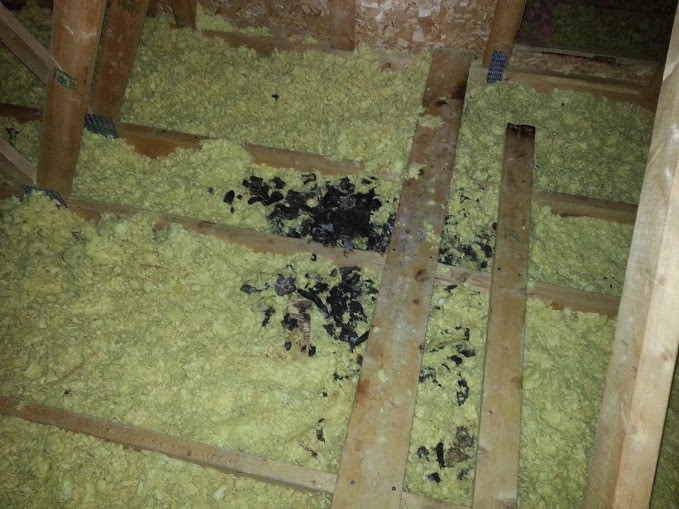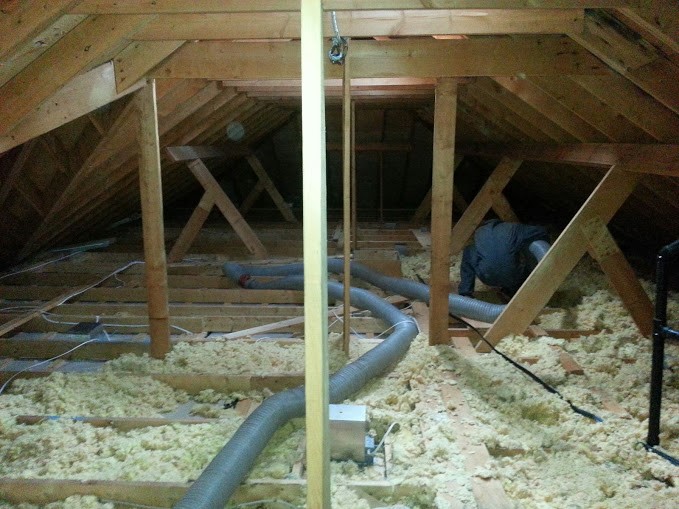Raccoons might be viewed by some as cute and cuddly. However, their droppings can carry many different diseases, parasites and viruses. If you have raccoons living on your property the droppings could be harmful to you and your pets. Infections can vary in health risk and concern, but all should be treated seriously. The most common infection related to raccoon droppings is Raccoon Roundworm.

Raccoon feces inside an attic.
Raccoon Roundworm
Raccoon roundworm is called Baylisascaris when it infects humans. Infected raccoons shed roundworm eggs in their feces. Raccoons have the habit of defecating in the same place repeatedly. These places are known as latrines and they allow the virus to become concentrated in a specific area. Infected raccoons shed millions of eggs in their feces. Eggs can survive for years through most environmental conditions with adequate moisture. If you have raccoons living in your attic or chimney or under your deck then you can bet there’s a latrine nearby.
Infection spreads when eggs are ingested. People become infected when ingesting eggs from soil, water, hands or other objects contaminated by raccoon feces. Toddlers and young children are considered most at risk because of their propensity for putting dirt and dirty hands in their mouths. Larvae hatch in the intestine and travel through the host’s tissue, in particular the brain. It can also be spread amongst other wildlife after eating smaller species already infected.
Symptoms
Symptoms begin to show between one and four weeks after exposure. Once the eggs hatch into larvae they migrate through the liver, brain, spinal cord and other organs. Ingesting a small amount of eggs could result in limited or no symptoms. A large ingestion of eggs can lead to serious symptoms including nausea, fatigue, liver enlargement, lack of coordination, lack of attention, loss of muscle control, coma and blindness. There is no way to successfully treat Baylisascaris and some cases have been fatal. Young children have a higher risk for large scale tissue damage because their bodies and brains are smaller.

Raccoon feces removal from attic insulation using a gas powered vacuum.
How to protect yourself from raccoon roundworm
There is no effective cure for the disease and raccoons in are neighbourhoods are here to stay. The best way to avoid infection is to limit your direct contact with raccoons especially their droppings. Do not keep, feed or adopt raccoons. Try your best to discourage raccoons from living on our property and stay away from raccoon latrines typically found at the base of trees, on roofs and near window wells.
Raccoon droppings are dark and tubular with a very pungent odour often containing undigested seeds and other food items. Wear appropriate safety equipment including disposable gloves and facemask when removing raccoon feces. Hard surfaces can be treated with boiling waters and always wash your hands thoroughly when working in your yard or garden.
How to keep raccoons away from your house
- Remove food sources.
- Keep garbage areas secure and free of food scraps.
- Keep garden trimmed and remove clutter that raccoons could use to den.
- Limit access to your roof by cutting back tree branches.
- Repair any holes or openings found along your roofline, deck porch or shed.
- Call a professional for effective raccoon removal.
Raccoon Removal
Raccoon feces removal is a very messy and potentially dangerous task. If you’ve had raccoons living inside your attic or chimney it’s wise to leave the cleanup to qualified professionals.
If you discover raccoons or their latrines on your property contact Skedaddle Humane Wildlife Control. Our technicians have the training and experience needed to remove raccoons from your house and prevent their re-entry. We’re also equipped to clean and remove dangerous raccoon feces and replace soiled attic insulation.
Call today! 1-888-592-0387


